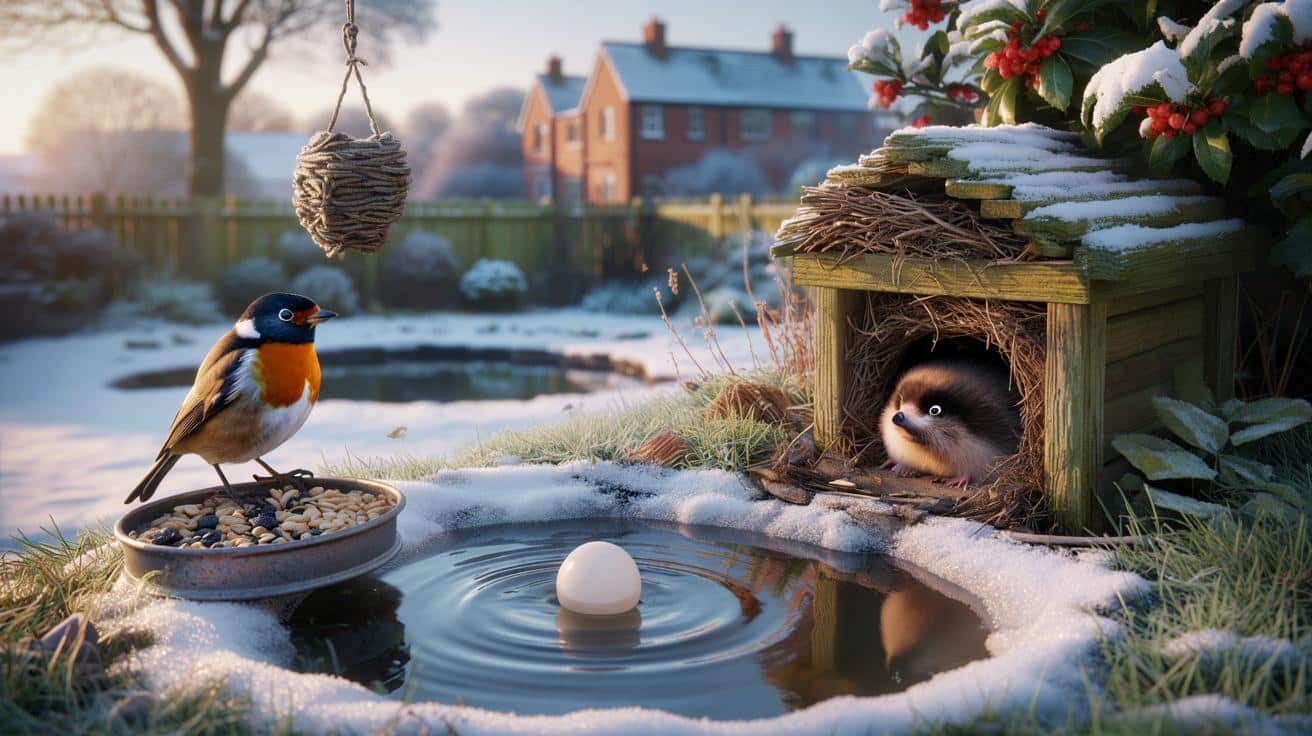Here is how to keep them alive without upending your plot.
Across the UK, sleet and snow have swept in and held on, turning gardens into hard places for wildlife to find food and shelter. The cold forces energy use up while natural supplies shrink. That double hit can be fatal for the small creatures that bring our plots to life.
Right now matters. As temperatures dip below zero and ponds crust over, a little help from us can bridge the gap until milder days return. And the steps are easier than you might think.
The winter reality that drains small birds overnight
Short days and freezing nights leave birds racing to replace lost energy. « In the colder months, small birds can lose up to 10% of their body mass on a freezing night, and they must quickly replenish those lost calories at dawn to survive the day and gear up for another frigid night, » said Sean McMenemy, nature expert and founder of Ark Wildlife. That single figure underlines the urgency at the first light.
Hedgehogs hibernate from October to April in normal years, yet the cold still finds them. If their body temperature slips below four degrees, they risk frostbite or worse, especially during snowy snaps. Flooding that accompanies winter storms can also threaten them as they sleep, since they cannot easily escape saturated ground.
Frogs and other amphibians slow down in winter and shelter in ponds or under logs, which makes frozen water a real hazard. Squirrels burn precious calories to keep warm as well. And yet, with a few timely tweaks, gardens can buffer all of them from the worst of the freeze.
Food and water ideas that work when ponds freeze
Top up feeders and keep water open. Holly Jones, Sales and Marketing Manager at Garden Street, recommended boosting calories for the chill. For winter feeding, Jones said, « offer high-energy foods like sunflower seeds, fat balls, and mealworms, » and explained that this helps small birds rebuild the energy they lose overnight.
For squirrels, Holly Jones said, « unsalted nuts, fruits, and seeds. » For hedgehogs, Jones added, « Put out cat or dog food (not fish-based) and fresh water. » These are simple, low-cost changes that suit todays cold snap across Britain.
Water is as critical as food when ice bites. « Keep an eye on the water to make sure it doesn’t freeze solid. A little trick is to pop a ping pong ball in the water, the movement will help stop the surface from icing over. If it does freeze, just gently break the ice or add some fresh water and your feathered friends will flock to their chilly watering hole in no time, » said Sean McMenemy.
Ponds need careful handling. « If you have a pond, keeping part of it ice-free during winter is super important for all the amphibians, fish, and other wildlife that call it home. A floating ball or a pond de-icer can create a little opening in the ice, allowing oxygen to flow into the water and preventing harmful gases from building up beneath the surface, » added Sean McMenemy. « If your pond does freeze, resist the urge to smash the ice – this can send shockwaves through the water, potentially harming the creatures underneath. Instead, gently place a warm pan of water on the ice to melt a small hole naturally. »
Shelters that turn a corner of your garden into a haven
Safe cover reduces energy loss and offers a refuge from wind and snow. « A well-placed roosting pouch gives small birds like robins, tits and sparrows a safe, snug space to roost when the weather turns rough, » said Sean McMenemy. Check any bird box you already have, add insulation such as a handful of dry wood shavings, and position it away from prevailing wind and prowling predators.
For hedgehogs, the answer is simple. « One of the simplest ways to help is providing hedgehogs with a hedgehog house, » explained Sean McMenemy. « You can simply leave a corner of your garden wild with sticks, logs and garden debris to create a comfy hideaway where hedgehogs will feel right at home! » That wild corner also shelters insects that birds rely on once the thaw comes.
Even small gardens can work. A tucked-away roosting pouch, a log pile, and a dish of fresh water kept ice free can carry a surprising load. Keep disturbance low and let the cover do its job.
The quiet kit that pays off in January snow
When Britain freezes, a few pieces of kit make winter support effortless. A sturdy roosting pouch helps small garden birds conserve warmth. Quality fat balls deliver dense energy in the hours after dawn, when every calorie counts. A simple hedgehog house offers a dry, stable retreat through the worst of the cold.
Keep a ping pong ball by your bird bath to stop the surface sealing over, as Sean McMenemy suggested. A floating ball on the pond can keep a breathing hole open for amphibians as well. And yes, refresh water in shallow dishes each morning so wildlife never has to work for a drink.
None of this requires a makeover. It is about topping up calories and keeping ice at bay through the coldest spells. Do that, and you give wildlife the best chance of greeting the first warm morning in spring.









